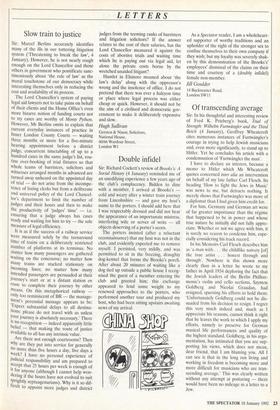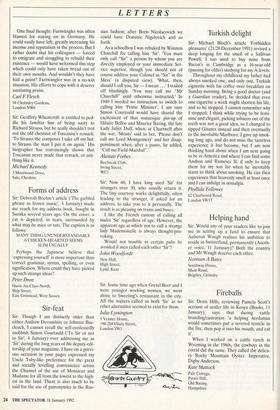Of transcending average
Sir: In his thoughtful and interesting review of Fred K. Prieberg's book, Trial of Strength: Wilhelm Purim:Mgler and the Third Reich (4 January), Geoffrey Wheatcroft cites numerous instances of Furtwangler's courage in trying to help Jewish musicians and, even more significantly, to stand up to Hitler. Yet he concludes his article with a condemnation of `Furtwangler the man'.
I have to declare an interest, because a memo to Hitler which Mr Wheatcroft quotes concerned inter alia an intervention on behalf of my late father Carl Flesch. Its heading 'How to fight the Jews in Music' was news to me, but detracts nothing. It merely shows that Furtwangler was more of a diplomat than I had given him credit for.
For him, Germany and German art were of far greater importance than the regime that happened to be in power and whose true nature he initially did not fully appre- ciate. Whether or not we agree with him, it is surely no reason to condemn him, espe- cially considering his track record.
In his Memoirs Carl Flesch describes him as 'a man with . . . the childlike naivety [of] the true artist . . . honest through and through'. Nowhere is this shown more clearly than in a letter he wrote to my father in April 1934 deploring the fact that the Jewish leaders of the Berlin Philhar- monic's violin and cello sections, Szymon Goldberg and Nicolai Graudan, had resigned, spurning his efforts to hold them: `Unfortunately Goldberg could not be dis- suaded from his decision to resign. I regret this very much indeed and, much as I appreciate his reasons, cannot think it right that he leaves the work to which I apply my efforts, namely to preserve for German musical life performances and quality of the highest standard. Goldberg, in his argu- mentation, has intimated that you are sup- porting his views, which does not mean, dear friend, that I am blaming you. All I can see is that in the long run living and working in freedom is becoming more and more difficult for musicians who are tran- scending average.' This was clearly written without any attempt at posturing — there would have been no mileage in a letter to a Jew.
LETTERS
One final thought: Furtwangler was often blamed for staying on in Germany. He could easily have left, greatly increasing his income and reputation in the process. But I rather doubt that his colleagues — forced to emigrate and struggling to rebuild their existence — would have welcomed this step which could only have taken bread out of their own mouths. And wouldn't they have had a point? Furtwangler was in a no-win situation. His efforts to cope with it deserve unstinting praise.
Carl F Flesch
94 Cholmley Gardens, London NW6



















































 Previous page
Previous page